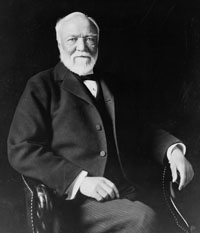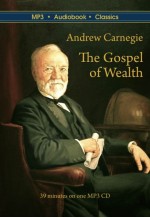Andrew Carnegie
 |
Andrew Carnegie (November 25, 1835-August 11, 1919) was a Scottish-American industrialist and philanthropist who emigrated from Scotland in his early teens and worked his way through the telegraph and railroad businesses to eventually establish The Carnegie Steel Company, which, together with its sister companies, dominated the gigantic steel industry during America’s period of rapid growth in the 1800’s and made him an extraordinarily wealthy man. He had a gift for organization and believed in vertical integration, controlling costs and quality during every step in the process, so that his companies mined the ore and made the coke in addition to smelting the metal and rolling the steel. When he sold the firm to J. P. Morgan in 1901 for over $305 million it became the U. S. Steel Corporation and Carnegie surpassed John D. Rockefeller as the richest man in America for a few years. He opposed imperialism, and volunteered to buy the Philippine Islands for $20 million to secure independence for the Filipino people after the Spanish-American War. Carnegie strongly believed that a man should spend the first third of his life acquiring education, the second third accumulating wealth, and the final third distributing surplus wealth to benefit mankind. He felt strongly that rich people should not live ostentatiously, that heirs and dependents should be left with no more than a modest allowance, and that personal fortunes should be subject to progressive inheritance taxes. He set an example by giving away 90% of his fortune to numerous causes, notably the construction of thousands of libraries and the building of Carnegie Hall and Carnegie Mellon University. |
The Gospel of Wealth
Andrew Carnegie, an immigrant from Dunfermline, Scotland with only a grammar-school education, amass..
$7.99

